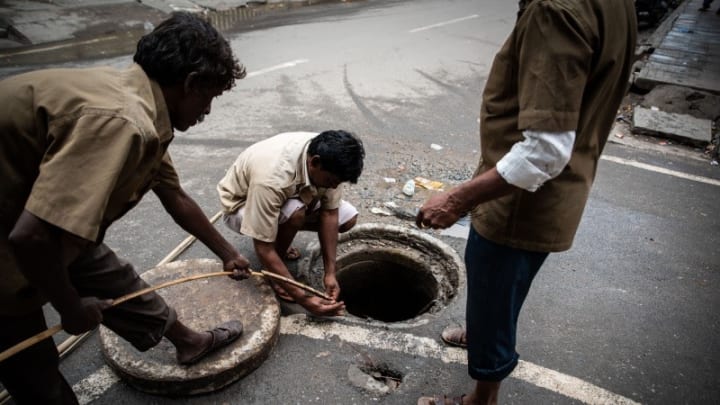
ALICANTE, Spain — Many sanitation and waste management workers are toiling during the COVID-19 pandemic as essential workers but do not have access to hand-washing facilities and personal protective equipment, aid organizations say.
A report by WaterAid, based on interviews with sanitation workers across the South Asian countries of Bangladesh, India, Nepal, and Pakistan, found that 40% reported a lack of hand-washing stations and said hand-washing was not consistently carried out at the times most relevant for COVID-19 prevention.
In India, a sanitation worker dies every 5 days. Here's how to change that.
Sanitation workers in low- and middle-income countries often lack safety equipment, labor rights, and social protection.
Rahima, a waste worker whose name has been changed to protect her identity, is one of many in Khulna, Bangladesh, who empties septic tanks and latrines and maintains the sewers. “I and other sanitation workers are the reason people can live at home during the lockdown without worrying about their waste disposal,” she said in a statement. Eight in 10 workers in Bangladesh said their job puts them at a high risk of contracting the coronavirus.
In Nepal, one-third of workers said they had received no PPE from their employers at all, and in contexts where it was provided, it was rarely sufficient.
While the rights of sanitation workers have long been ignored in some countries, COVID-19 has put their health and safety even further at risk.
“Sanitation workers have very little choice but to continue working throughout this pandemic, but they do so with little reward and often with none of the protective measures they need to keep them safe and healthy,” said Vanita Suneja, regional advocacy manager at WaterAid.
A lack of protection for sweepers, latrine cleaners, and hospital cleaners could also increase the spread of the virus. In Bangladesh, over 317,000 COVID-19 cases have been reported since the start of the pandemic. That number stands at over 3.8 million in India, while Nepal has over 41,000 cases.
This is not just an issue in South Asia, though. Valbett Adera, project manager at Sanergy — a sanitation-focused social enterprise operating in Africa — said it is seeing the same lack of PPE in Nairobi’s informal settlements. “One of the things they [sanitation workers] are required to use while working are face coverings, but if they do not have this, then they are more exposed to COVID,” Adera said, adding they must be given a consistent supply of boots, gloves, and masks beyond the pandemic.
Without such equipment, workers are exposed to infection, illness, injury, and even death. In India, one manhole worker died every five days between 2017 and late 2018.
“Sanitation workers have very little choice but to continue working throughout this pandemic.”
— Vanita Suneja, regional advocacy manager, WaterAidAs COVID-19 adds to the list of potential risks they face, WaterAid is calling for immediate action to cover both formal and informal workers, including emergency financing to support their safety and the provision of health insurance.
Sanitation workers in low- and middle-income countries, who are often informal workers, have little in the way of labor rights and social protection and face societal stigma. “We are continuing our job under great risk only to give the public some level of comfort. But it is very unfortunate that people do not value our sacrifice,” Rahima said.
Last year, the International Labour Organization, WaterAid, the World Bank, and the World Health Organization called for more effort from all sectors to improve working conditions and formalize workers’ rights.
“Only with proper job recognition and protections will these essential workers be able to stay safe whilst carrying out some of the most important roles in our society,” Suneja said.
In the longer term, WaterAid said review of urban plans, investment, support of workers’ representation, and engagement with authorities would be required.

